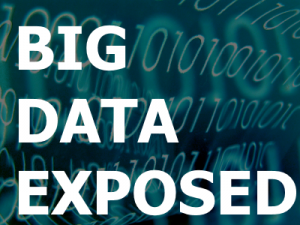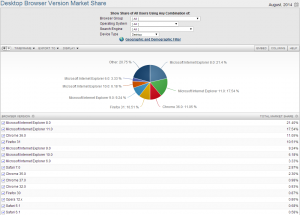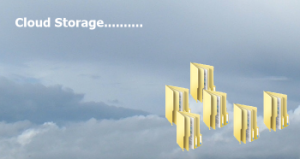
An SME owner’s (non-technical) perspective on the impact of Big Data.
People like to compare, categorise and count. From basic ‘one, two, many’ counting systems to hyper-complex variations on different types of infinities, we seem to be impelled to view patterns, detect trends and evaluate our daily experiences, individually and collectively, through numerical frameworks. At a mundane level, we value our work input in terms of money earned and measure business performance by accounting for profit or loss; more imaginatively, we give dimension to the universe by calculating light-years between galaxies to which none of us could ever travel, but which we like to count anyway!
Over the last 60 years, computers have enabled us to count (and record our totals) at an increasing pace and to a magnitude that would have appeared both incomprehensible and functionally senseless to many of those early IT pioneers. “Why would we ever need to count so much, so quickly?”, they might have asked. The current benefits of storing petabytes of data on the internet on a daily basis (Google processes lots of petabytes, by the way) were not so obvious in the 1950s, when the technological challenges were focused on making the great mainframes hulks more reliable and keeping them cool enough to work. But now, our IT capabilities have made the compilation of massive data-sets seem almost routine. Big Data, as a concept, is emerging as the latest evolutionary step in a line which includes its earlier diminutive cousins – relational databases and data-warehousing.
But doesn’t the ‘Big’ in Big Data signify that it is only of relevance to big organisations and groups which can access and analyse it? As a small B2B business owner, I don’t believe that to be the case, so here’s my take on what the existence of Big Data means for SMEs. I’ll start with two brief scene-setting questions – How have we created it and why do we think it’s worth having?
How have we been able to collect so many data-sets, public and private, in such a comparatively short period of time from the birth of the modern computer? The expansion of IT and the internet into daily living– and their adoption and understanding by the masses in the last two decades via PCs and smartphones – have allowed us to record our counts super-massively and with unimaginable speed. The sense of amazement I felt in the late 70s when hearing that a program would be able to carry out the calculations necessary for a college project OVERNIGHT appears embarrassingly naïve today. We’ve all heard the one about the computing power that guided the first men to land on the moon – that there’s more ‘oomph’ in a modern washing-machine chip now than in the whole of NASA in 1969 – stretches the comparison somewhat, but it makes the point that almost-microscopic processors are now orders of magnitude more powerful than their pioneering mainframe progenitors. And today, when we can link up computers in very large arrays to view the universe, analyse statistics on diseases via PCs connected across continents or announce our every waking thought on vast social media ‘soapboxes’, then our sense of conquest – that there is no piece of recordable data out there which we cannot collect and store – becomes limitless. Which leads me to ‘why’?
Why is having Big Data beneficial? That’s been part-answered in my introductory comments. We like to collect, compare and count things, and to me, in a sense, the numbers we can define and then amass on our storage systems have become those ‘things’. So, some of the answer as to why we deem it worthwhile creating evermore data is because “we can” (the mountain’s there, so climb it). Big Data’s existence, as a by-product of the internet-age, reaffirms to us that we can keep tallies of what matters to us. However, whereas, for the first 50 years of the technical development of IT, increasing memory and speeding up the circuitry to pipe the 1s and 0s to their storage point was the main focus (the digits were the means to the end), once the engineering reached a level of efficiency and reliability to guarantee operating stability, deciding what could now be done with the data thereby collected – the things as objects – became the scientific quest.
So, the question has moved on to become ‘what’s the point of Big Data – how can we extract information we believe to lie in the layer upon layer of digital substrates that form the internet’? Can Big Data, envisaged as a constantly growing entity it itself, a real-time flow of interactions across networks between people and organisations, now be mined by those with the sophisticated analytical skills and insight to ask the right questions, to yield motherlodes of information that could improve our understanding of human behaviour in a vast range of contexts? The answer, of course, is yes it can.
At a practical level, I’ve mentioned Big Data being analysed by astronomers and medical researchers to give but two small examples of how it is being exploited to test theories and hypotheses. There are, of course, other areas where Big Data is providing previously unavailable opportunities for other types of organisations and individuals to delve into data-sets to ask their own questions, be they commercial, not for profit or academic. For example, the main accountancy firms are in the process rapidly developing their capabilities to purchase and analyse Big Data as the value of their compliance services (making sure tax and other statutory returns are being made on time) diminishes and business-advisory (selling knowledge back to a business to help it grow or manage itself better) increasingly generates larger margins from their clients. My focus, however, now turns to what impact Big Data is having on SMEs by considering two cases based upon real contemporary events.
My first scenario originates from the world of banking, admittedly not the most popular of professions currently, but an essential commercial service for SMEs. The analyses emerging from the masses of Big Data on our transactions the banks own are revealing the fundamental changes in the way we use and interact with our money. Retail banks are closing branches and laying off staff in their thousands, not without complaint or customer reaction, but nevertheless with confidence that it’s the right thing to do. Why? Because they know, from near real-time Big Data analyses, that more customers are using internet banking and a decreasing number see any need to visit a branch (knowing your local bank manager is no longer a selling feature for your banking services – if it ever was for the majority of us). Having access to your accounts from your mobile phone has much more relevance, and therefore more value, for customers. This is not some banker’s hunch; the analytics prove it, right now! They see cash transactions dropping as cards and smartphone payment facilities are used to make 60% of purchases below £20 by some client demographics – and this is not being restricted to younger customers.
So what’s the impact on SMEs of this evidence from banking Big Data analyses? Well, at a basic practical level, it forcefully shows the more ‘cash-based’ trader that offering cashless payment facilities to customers will definitely bring in more business. However, for me there’s an additional learning point that has emerged from the banks’ current infrastructural changes – it demonstrates that Big Data can now be analysed in such a way as to provide reliable answers to increasingly specific and complex questions about commercial activity.
The banks and other organisations utilising Big Data are not ‘taking a punt’ when they decide to implement radical changes in their structure or operations. Rational decisions are being made, after analysing near real-time information, on product development, marketing campaigns and organisational structure because Big Data supports adaptive change to take place based upon what is required today. Likewise for ambitious SMEs, the opportunities are expanding to access meaningful information about their markets in their geographies that is near-real time, not months out-of-date or carelessly slung together from national marketing samples and sold at extortionate rates. Sure there will be a cost to obtain such intelligence, but there are more data-analysis organisations in the market which will provide more relevant and reliable external information than was available before. Big Data will allow SMEs to be more informed decision-makers, just as it has made large organisations more adaptive decision-makers.
My second scenario arises from a recent Big Data analysis conducted by an expanding financial management app company which provides services specifically for SMEs. Basic, easy-to-use (but perfectly functional and compliant) bookkeeping and accounting apps are now being marketed with the small business owner being viewed as the main purchaser, not their accountant. For most of the UK’s 4 million SMEs, getting over the unappealing bookkeeping hurdle could be made really simple (even enjoyable, for some) by adopting any one of the online financial management services such as Free Agent, QuickBooks and Sage Online. These make simple accounting very affordable and straightforward to do and allow the working relationship with one’s accountant to become more productive as the streamlined and rapid data-input process removes the drudgery of the paperwork, allowing a business to keep close to its most valuable asset – its information, i.e. those facts and figures that let it know how it is performing operationally and commercially. And here Big Data and small business inevitably and fortuitously collide.
Every online transaction is securely recorded in the Cloud by the SaaS providers – so they collectively have the records of their customers’ businesses writ very large. They know, from the transactional data that we pass to them, how we behave as organisations. For my example, Xero.com, a financial management app specialising in the SME market in the US, UK and the Antipodes, has used its anonymised data-sets to demonstrate that businesses which invoice promptly using online delivery methods can reduce their debtor days by 40%. Big Data on how SMEs manage their finances, once more in near real-time, has provided contemporary evidence not only that efficient invoicing gets you paid quicker (which we already knew) but also that using email to send out your bills and offering payment services to your customers can get you paid in 24 days rather than 40; this insight could be worth a fair bit to a cash-strapped business. So SMEs, utilising cloud-based financial, administrative and operational apps, can benefit from contributing their transactional records to a vast data-pool which can be analysed to give back information on comparative performance when measured against their peers.
The development of key performance indicators (KPIs) for SMEs will be an increasingly active market in the next few years. Competitive advantage will attained by those businesses which understand the value of devising and measuring KPIs which are specific to sector, geography, technology or markets and which have access to insightful analysts who understand the product or service being offered to customers. Analysis for its own sake has never been sufficient, but Big Data now makes more purposeful, commercially-focused analysis possible for even the smallest of businesses. Knowing why customers accept or reject what the market is offering can be gleaned from Big Data examinations of purchasing behaviour married to key-word reviews of social media comments. While the vast majority of SMEs are not able to do this for themselves, the opportunities to benefit from the existence of Big Data are beginning to open up through the growth in the tailored data-analytics market.
So, by moving into the era of Big Data, our ability to count has moved one stage further along the developmental path that started with ‘one, two, many’. We now, large and small businesses alike, must now count ‘one, two, how many?’ in order to profit from the advantages that Big Data offers us all to improve our analysis and decision-making.
What are your experiences and thoughts on Big Data and how we can use it?
Guest Blogger this month is
Rory H D Cooper
Managing Director
Canmore in Business
www.canmore.co






